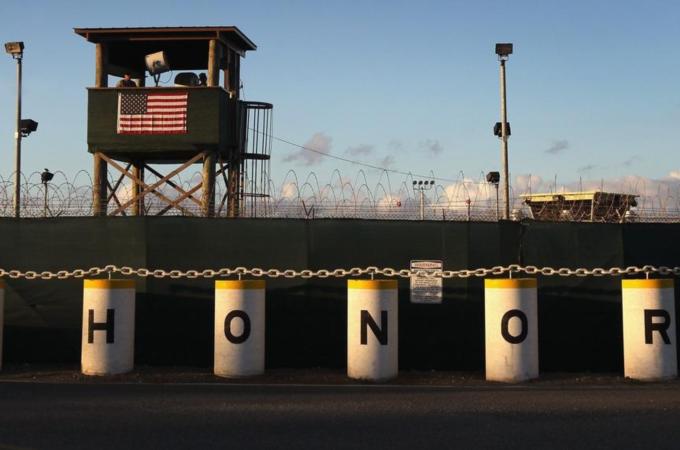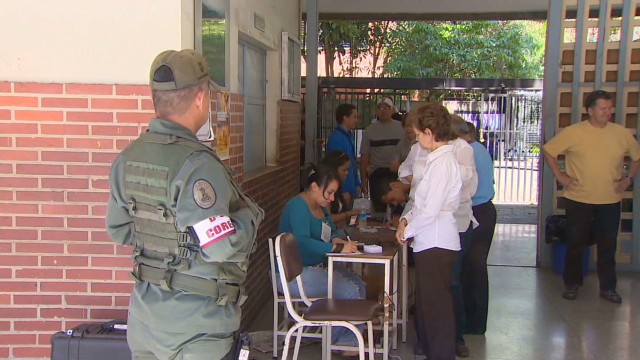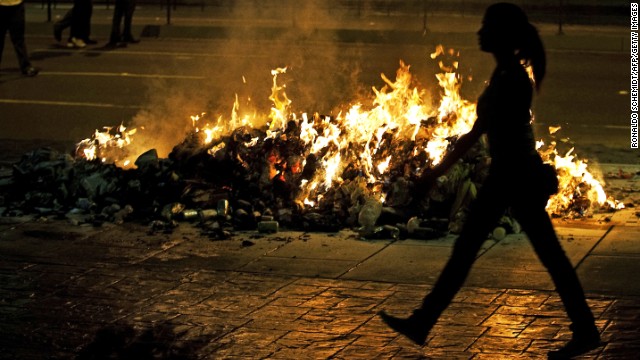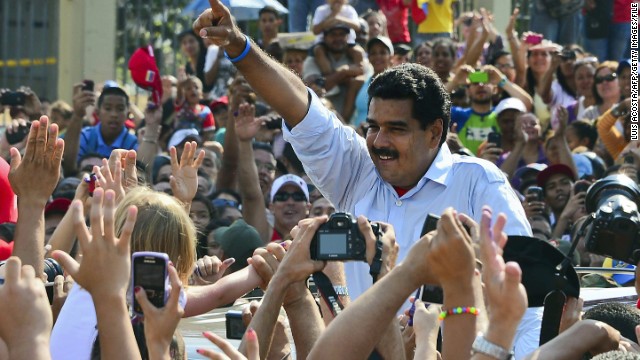Half of Guantanamo detainees on hunger strike |
US military to send more medical personnel to prison camp as 84 of 166 inmates are refusing meals.
Last Modified: 23 Apr 2013 03:26
|

Lawyers for prisoners say the protest reflects frustration with the failure to resolve their fate [GALLO/GETTY]
|
| More than half of the men held at the Guantanamo detention camp have joined an escalating hunger strike to protest their open-ended detention, a camp spokesman has said. The US military counted 84 of the 166 prisoners as hunger strikers and was force-feeding 16 of them liquid meals through tubes inserted in their noses and down into their stomachs. Six were hospitalised for observation, Lieutenant Colonel Samuel House, a spokesman for the detention operation at the Guantanamo Bay US Naval Base, said on Monday.. Hunger strikes have occurred at the facility in southeastern Cuba since shortly after the US began detaining suspected al-Qaeda and Taliban captives there in January 2002. The current hunger strike began in early February, after guards seized photos and other belongings during a cell search. Prisoners said the guards had also mistreated their Qurans during the search, which the US military denies. Medical reinforcements House said the US military is sending additional medical personnel to the prison camp as a consequence of the increasing number of detainees on hunger strike. He said the new arrivals, numbering under 40, would include a doctor, nurses, corpsmen and medics, who will supplement the 100 medical personnel already on duty. Forty-three prisoners had joined the hunger strike by April 13, when guards in riot gear swept through a communal prison and forced the detainees into one-man cells where they could be better monitored. Camp officials said the detainees had covered the security cameras and windows, blocking guards' view. The number refusing meals has grown steadily since then, and two prisoners tried to kill themselves by making nooses with their clothing, House said. Though the cell search was the immediate trigger, military officials and lawyers for the prisoners have said the protest generally reflects frustration with the failure to resolve the inmates' fate. Most have been held for more than a decade without charge or trial and President Barack Obama has blamed Congress for preventing the closure of the prison. "It's escalated because the men are desperate and they've hit a breaking point," said Carlos Warner, a federal public defender from Ohio who is part of a team representing 11 Guantanamo prisoners. "Really what is behind all this is the president abandoned his promise to close Guantanamo. The men know that, they're desperate." |
LVHS IR/GSI Blog: The Americas (2nd)
Mr. Bailey's 2nd Block IR-GSI Class blog focused on the current events of the Americas
Tuesday, April 23, 2013
Half of Guantanamo detainees on hunger strike
Tobacco magnate wins Paraguay election
Tobacco magnate wins Paraguay election |
Horacio Cartes defeats Liberal Party rival to fill post left vacant by President Fernando Lugo's impeachment last year.
Last Modified: 22 Apr 2013 13:45
|
| Paraguayans have elected Horacio Cartes, leader of the Colorado Party and one of the country's richest men, to the post left vacant by President Fernando Lugo's impeachment last year. The millionaire businessman won a five-year term with 46 percent of the vote over 37 percent for Efrain Alegre of the ruling Liberal party, the Electoral Court announced after most votes were counted. Five other candidates trailed far behind. Cartes, 56, had never voted before he joined the Colorado Party four years ago. He pledged to reform his party, which was tainted by corruption during its 60-year reign until 2008. "I'll need help from all the Paraguayans to govern in the next five years," Cartes said on Sunday night. "Poverty, the lack of jobs for young people and international issues await us." 'Nothing more to say' The UN estimates that more than half of Paraguayans live in poverty. Paraguay's census bureau puts the number at 39 percent in a country which is South America's third-biggest producer of soy, corn and sunflower seeds. The president-elect owns controlling shares in banks, investment funds, agricultural estates, a soda makerand tobacco plantations. Cartes is well-known in Paraguay as president of Libertad, the club that won last year's national football championship. Alegre, 50, a lawyer and career politician, recognised his defeat despite saying earlier that he might challenge the outcome. "The Paraguayan people have spoken. There's nothing more to say," he said in a brief concession speech. Alegre's Liberal Party took over the presidency after withdrawing support for Lugo and clearing the way for his impeachment in June. Congress removed Lugo, a leftist and former Roman Catholic bishop, after finding him guilty of mishandling a botched land eviction in which 17 police officers and peasant farmers were killed. Some of Paraguay's neighbours compared the two-day trial to a coup and imposed diplomatic sanctions on the South American nation. Sex scandal The leftist coalition that swept Lugo to power has since split, although the former president was again on the ballot, this time as a Senate candidate. Lugo's administration was rocked by a sex scandal, after he admitted to having fathered two children out of wedlock while he was still a priest, and he faces at least two other as-yet unresolved paternity suits. Many Paraguayans hope this election will encourage other countries to restore full relations. Paraguay's serving president, Federico Franco, is barred by the constitution from running for re-election even though he is just serving out what remained of Lugo's five-year term. He will hand over the presidency in August. Disillusioned voters Rivals have tried to link Cartes to drug running and money laundering, but he has never been charged with those crimes. "The accusations made during this campaign have no truth to them, and personally I am very serene," Cartes said on Sunday. Al Jazeera's Mariana Sanchez, reporting from Asuncion on Sunday, said many voters told her they were disillusioned by Lugo and wanted the Colorado Party to return to power. "I talked to many people here who wanted change and since they were disillusioned by Lugo, they said change meant going back to the very conservative Colorado Party," she said. Alegre had led corruption investigations in Congress, but his reputation as an honest administrator was undermined by an investigation into whether he misappropriated state funds while serving as Lugo's public works minister. Paraguay's 3.5 million voters also cast ballots on Sunday for the country's legislature, 17 governors, local authorities and members of Congress. |
Friday, April 19, 2013
Venezuela to audit remaining electronic votes
| |
National election watchdog says it audit 46 percent of machines that were not checked immediately after Sunday's vote.Last Modified: 19 Apr 2013 09:55 | |
| Venezuela's electoral council has said it will audit the voting machines that were not audited on election night in an apparent rejection of the opposition's demand for a full vote-by-vote recount. Tibisay Lucena, the National Electoral Council (CNE) president, said on Thursday night that it would audit the 46 percent of the machines that were not audited immediately after Sunday's vote. Opposition candidate Henrique Capriles has presented a series of allegations of vote fraud and other irregularities to back up his demand for a vote-by-vote recount for the presidential election. "We do this [expand the audit] in order to preserve a climate of harmony ... and isolate violent sectors that are seeking to injure democracy," Lucena said in a televised speech. Venezuela's opposition leader Henrique Capriles said on Thursday he accepted the election authority's decision to audit the rest of the electronic votes, and said he believed his team would be vindicated. "We can show the country the truth ... with this, we're where we want to be," Capriles told reporters after the CNE announcement. Ruling party candidate Nicolas Maduro, the handpicked successor of the late Hugo Chavez, was declared the winner by 262,000 votes out of 14.9 million cast. |
Thursday, April 18, 2013
Corruption charges dropped against retired Mexican general
(CNN) -- A imprisoned former Mexican general has been released for lack of evidence nearly a year after his arrest on corruption charges.
Retired Gen. Tomas Angeles Dauahare, along with three other high-ranking military leaders, was accused of ties to drug traffickers. He was arrested in May and formally charged in August.
The arrests shook confidence in the military, which under former President Felipe Calderon had done the heavy lifting in the offensive against drug cartels. The military was chosen to go after the cartels because it was seen as less corruptible than local and state forces.
At the time of the arrests, lawmakers lamented what they said could be one of the highest-level corruption cases in Mexico's recent history.
Manual recount not possible in Venezuela, chief justice says

Caracas, Venezuela (CNN) -- A manual recount of votes isn't possible in Venezuela, the head of the country's Supreme Court said Wednesday, suggesting there is no legal basis for the opposition's push for a ballot-by-ballot audit of the narrow presidential election results.
In nationally televised remarks, Venezuelan Chief Justice Luisa Estella Morales said Venezuela's 1999 constitution eliminated manual recounts in favor of a "system audit."
"In Venezuela the electoral system is completely automated. Therefore, a manual count does not exist. Anyone who thought that could really happen has been deceived," she said. "The majority of those who are asking for a manual count know it and are clear about it. Elections are not audited ballot by ballot but through the system."
Why Venezuela is so divided

Caracas, Venezuela (CNN) -- As if on cue, Ermelinda Briceno entered the makeshift shrine to Hugo Chavez and shed a tear. This place of reverence to "el Comandante," the president of Venezuela for 14 years, popped up in this poor neighborhood after Chavez's death last month.
Briceno said her devotion to Chavez is unshakable. But she understands why even some who supported the late president were reluctant to vote for his handpicked successor, Nicolas Maduro.
"I think a lot of people didn't know Maduro so they didn't vote (for him) but here we are, it was very close," Briceno said.
Hugo Chavez's political heir Nicolas Maduro named Venezuela's president-elect

(CNN) -- Election authorities proclaimed Hugo Chavez's handpicked successor Venezuela's president-elect Monday, despite his challenger's demand for a recount.
"It was a result that was truly fair, constitutional and popular," Nicolas Maduro said, criticizing his opponent's refusal to concede.
Maduro secured 50.8% of votes in Sunday's election, while opposition candidate Henrique Capriles Radonski won 49.0%, Venezuela's National Electoral Council said Monday.
The South American country's top election official certified the results at a ceremony in Caracas, saying Venezuela's voting system had worked perfectly.
Subscribe to:
Posts (Atom)



